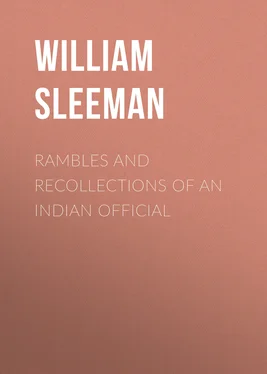William Sleeman - Rambles and Recollections of an Indian Official
Здесь есть возможность читать онлайн «William Sleeman - Rambles and Recollections of an Indian Official» — ознакомительный отрывок электронной книги совершенно бесплатно, а после прочтения отрывка купить полную версию. В некоторых случаях можно слушать аудио, скачать через торрент в формате fb2 и присутствует краткое содержание. Жанр: Путешествия и география, История, foreign_edu, foreign_antique, foreign_prose, на английском языке. Описание произведения, (предисловие) а так же отзывы посетителей доступны на портале библиотеки ЛибКат.
- Название:Rambles and Recollections of an Indian Official
- Автор:
- Жанр:
- Год:неизвестен
- ISBN:нет данных
- Рейтинг книги:4 / 5. Голосов: 1
-
Избранное:Добавить в избранное
- Отзывы:
-
Ваша оценка:
- 80
- 1
- 2
- 3
- 4
- 5
Rambles and Recollections of an Indian Official: краткое содержание, описание и аннотация
Предлагаем к чтению аннотацию, описание, краткое содержание или предисловие (зависит от того, что написал сам автор книги «Rambles and Recollections of an Indian Official»). Если вы не нашли необходимую информацию о книге — напишите в комментариях, мы постараемся отыскать её.
Rambles and Recollections of an Indian Official — читать онлайн ознакомительный отрывок
Ниже представлен текст книги, разбитый по страницам. Система сохранения места последней прочитанной страницы, позволяет с удобством читать онлайн бесплатно книгу «Rambles and Recollections of an Indian Official», без необходимости каждый раз заново искать на чём Вы остановились. Поставьте закладку, и сможете в любой момент перейти на страницу, на которой закончили чтение.
Интервал:
Закладка:
'I reside in my hut by the side of the road a mile and [a] half from the town, and live upon the bounty of travellers, and the people of the surrounding villages. About six weeks ago, I was sitting by the side of my shrine after saying prayers, with my only son, about ten years of age, when a man came up with his wife, his son, and his daughter, the one a little older, and the other a little younger than my boy. They baked and ate their bread near my shrine, and gave me flour enough to make two cakes. This I prepared and baked. My boy was hungry, and ate one cake and a half. I ate only half a one, for I was not hungry. I had a few days before purchased a new blanket for my boy, and it was hanging in a branch of the tree that shaded the shrine, when these people came. My son and I soon became stupefied. I saw him fall asleep, and I soon followed. I awoke again in the evening, and found myself in a pool of water. I had sense enough to crawl towards my boy. I found him still breathing, and I sat by him with his head in my lap, where he soon died. It was now evening, and I got up, and wandered about all night picking straws—I know not why. I was not yet quite sensible. During the night the wolves ate my poor boy. I heard this from travellers, and went and gathered up his bones and buried them in the shrine. I did not quite recover till the third day, when I found that some washerwomen had put me into the pool, and left me there with my head out, in hopes that this would revive me; but they had no hope of my son. I was then taken to the police of the town; but the landholders had begged me to say nothing about the poisoners, lest it might get them and their village community into trouble. The man was tall and fair, and about thirty- five; the woman short, stout, and fair, and about thirty; two of her teeth projected a good deal; the boy's eyelids were much diseased.'
All this he told me without the slightest appearance of emotion, for he had not seen any appearance of it in me, or my Persian writer; and a casual European observer would perhaps have exclaimed, 'What brutes these natives are! This fellow feels no more for the loss of his only son than he would for that of a goat'. But I knew the feeling was there. The Persian writer put up his paper, and closed his inkstand, and the following dialogue, word for word, took place between me and the old man:
Question .—What made you conceal the real cause of your boy's death, and tell the police that he had been killed, as well as eaten, by wolves?
Answer .—The landholders told me that they could never bring back my boy to life, and the whole village would be worried to death by them if I made any mention of the poison.
Question .—And if they were to be punished for this they would annoy you?
Answer .—Certainly. But I believed they advised me for my own good as well as their own.
Question .—And if they should turn you away from that place, could you not make another?
Answer .-Are not the bones of my poor boy there, and the trees that he and I planted and watched together for ten years?
Question .-Have you no other relations? What became of your boy's mother?
Answer .-She died at that place when my boy was only three months old. I have brought him up myself from that age; he was my only child, and he has been poisoned for the sake of the blanket! (Here the poor old man sobbed as if his heartstrings would break; and I was obliged to make him sit down on the floor while I walked up and down the room.)
Question .—Had you any children before?
Answer .—Yes, sir, we had several, but they all died before their mother. We had been reduced to beggary by misfortunes, and I had become too weak and ill to work. I buried my poor wife's bones by the side of the road where she died; raised the little shrine over them, planted the trees, and there have I sat ever since by her side, with our poor boy in my bosom. It is a sad place for wolves, and we used often to hear them howling outside; but my poor boy was never afraid of them when he knew I was near him. God preserved him to me, till the sight of the new blanket, for I had nothing else in the world, made these people poison us. I bought it for him only a few days before, when the rains were coming on, out of my savings-it was all I had. (The poor old man sobbed again, and sat down while I paced the room, lest I should sob also; my heart was becoming a little too large for its apartment.) 'I will never', continued he, 'quit the bones of my wife and child, and the tree that he and I watered for so many years. I have not many years to live; there I will spend them, whatever the landholders may do—they advised me for my own good, and will never turn me out.'
I found all the poor man stated to be true; the man and his wife had mixed poison with the flour to destroy the poor old man and his son for the sake of the new blanket which they saw hanging in the branch of the tree, and carried away with them. The poison used on such occasions is commonly the datura, and it is sometimes given in the hookah to be smoked, and at others in food. When they require to poison children as well as grown-up people, or women who do not smoke, they mix up the poison in food. The intention is almost always to destroy life, as 'dead men tell no tales'; but the poisoned people sometimes recover, as in the present case, and lead to the detection of the poisoners. The cases in which they recover are, however, rare, and of those who recover few are ever able to trace the poisoners; and, of those who recover and trace them, very few will ever undertake to prosecute them through the several courts of the magistrate, the sessions, and that of last instance in a distant district, to which the proceedings must be sent for final orders.
The impunity with which this crime is everywhere perpetrated, and its consequent increase in every part of India, are among the greatest evils with which the country is at this time affected. These poisoners are spread all over India, and are as numerous over the Bombay and Madras Presidencies as over that of Bengal. There is no road free from them, and throughout India there must be many hundreds who gain their subsistence by this trade alone. They put on all manner of disguises to suit their purpose; and, as they prey chiefly upon the poorer sort of travellers, they require to destroy the greater number of lives to make up their incomes. A party of two or three poisoners have very often succeeded in destroying another of eight or ten travellers with whom they have journeyed for some days, by pretending to give them a feast on the celebration of the anniversary of some family event. Sometimes an old woman or man will manage the thing alone, by gaining the confidence of travellers, and getting near the cooking-pots while they go aside; or when employed to bring the flour for the meal from the bazaar. The poison is put into the flour or the pot, as opportunity offers.
People of all castes and callings take to this trade, some casually, others for life, and others derive it from their parents or teachers. They assume all manner of disguises to suit their purposes; and the habits of cooking, eating, and sleeping on the side of the road, and smoking with strangers of seemingly the same caste, greatly facilitate their designs upon travellers. The small parties are unconnected with each other, and two parties never unite in the same cruise. The members of one party may be sometimes convicted and punished, but their conviction is accidental, for the system which has enabled us to put down the Thug associations cannot be applied, with any fair prospect of success, to the suppression of these pests to society. 180 180 The crime of poisoning travellers is still prevalent, and its detection is still attended by the difficulties described in the text. In some cases the criminals have been proved to belong to families of Thug stranglers. The poisoning of cattle by arsenic, for the sake of their hides, was very prevalent forty years ago, especially in the districts near Benares, but is now believed to be less practised. It was checked under the ordinary law by numerous convictions and severe sentences.
Интервал:
Закладка:
Похожие книги на «Rambles and Recollections of an Indian Official»
Представляем Вашему вниманию похожие книги на «Rambles and Recollections of an Indian Official» списком для выбора. Мы отобрали схожую по названию и смыслу литературу в надежде предоставить читателям больше вариантов отыскать новые, интересные, ещё непрочитанные произведения.
Обсуждение, отзывы о книге «Rambles and Recollections of an Indian Official» и просто собственные мнения читателей. Оставьте ваши комментарии, напишите, что Вы думаете о произведении, его смысле или главных героях. Укажите что конкретно понравилось, а что нет, и почему Вы так считаете.












